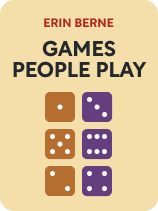

This article is an excerpt from the Shortform book guide to "Games People Play" by Eric Berne. Shortform has the world's best summaries and analyses of books you should be reading.
Like this article? Sign up for a free trial here .
What is Eric Berne’s Games People Play about? What is the key message to take away from the book?
Games People Play is Berne’s 1964 classic about the many ways that we habitually relate to one another through “games.” These aren’t fun, harmless social games, though—they’re subtle, largely unconscious patterns that harm us and our relationships.
Here’s our review of Games People Play: The Psychology of Human Relationships by Eric Berne.
About the Author
Eric Berne was a Canadian-born psychiatrist and author, prominent in the late 1950s and 1960s for creating Transactional Analysis, a new branch of psychiatry. Berne broke from the established approach of the time by focusing on social behavior, a pivot away from individually focused psychoanalysis.
Berne wrote Games People Play in 1964 to bring his approach to the public. It was a surprise hit, and it spent over two years on The New York Times bestseller list.
Soon after its release, Berne and his colleagues founded the International Transactional Analysis Association. Today the ITAA has members in 50 countries, who employ Transactional Analysis in counseling, therapy, education, and business development.
Berne was known for his wry humor, which is evident throughout the book, especially in the names he gives to the many games described.
Connect with the ITAA and Berne’s estate:
The Book’s Publication
Games People Play was first published in 1964 by Ballantine Books, now an imprint of Penguin Random House. Berne followed it with What Do You Say After You Say Hello? and Sex in Human Loving before his death in 1970. Games People Play has been republished multiple times, with the 2011 reprint featuring a new foreword from the then-president of the ITAA. We’ve based our guide on this edition, which makes no changes to the original text.
Historical Context
Psychology in Berne’s time was a field very much in development. Behaviorism—which takes observable behavior as the object of study—dominated in America, and Freudian psychoanalysis still held sway as well. It was the latter branch that Berne sought to join, training for more than 15 years and obtaining his MD from McGill University.
When he was rejected for membership as a psychoanalyst in the San Francisco Psychoanalytic Institute, Berne went his own way. He developed Transactional Analysis—his theory of how people relate—through the 1950s. Two books present his ideas: Games People Play, a slightly less technical overview; and Transactional Analysis in Psychotherapy, a fully technical articulation of his theory. T.A. was part of the humanistic psychology movement of the 1950s and 60s, a “third wave” to the first (Freudian psychoanalysis) and second (behaviorism à la B.F. Skinner).
Berne’s theory of how games work is still relevant, but many of his specific descriptions are somewhat outdated. What was in vogue in the 1960s was very different from today’s cultural mainstream—our slang, our mannerisms, the way we dress, the ways we relate to one other have all changed. Far more of us “hang out” or “chill” than have cocktail parties, for example.
Many of Berne’s games make sense; others are recognizable yet have a 60s’ feel to them. “Alcoholic” is clear, but “Schlemiel” is opaque, unless you’re familiar with old Yiddish stereotypes. “Frigid Wife” and “Perversion” similarly demonstrate the author’s outdated attitudes toward women and sexual nonconformity. We no longer pathologize unhappy wives or LGBT people, but such attitudes were the norm in Berne’s time.
Intellectual Context
Berne’s approach is influenced by Freud, yet leans substantially into humanistic psychology. Characterized by the Human Potential Movement, humanistic psychology focuses on self-awareness and our ability to develop in positive directions. This attitude is evident in Berne’s notion of autonomy, which is how he conceives of fulfilling your potential.
Berne borrows Freud’s way of diagnosing mental illnesses, though, and so inherits a pathology-focused attitude toward people and our minds. But he doesn’t completely follow Freud’s footsteps. Where Freud focused on dreams and interpretation of the unconscious, Berne studied people’s behaviors in social settings. Where Freud did one-on-one therapy, Berne engaged in group therapy as early as World War II, when he was an Army psychiatrist.
Despite gaining mainstream popularity, Berne struggled to gain acceptance from the psychoanalytic community. Some consider T.A. a pseudoscience, since his taxonomy of games references the categories he theorized more than empirical evidence.
Modern T.A allows practitioners to integrate tools from their favored methods. A transactional analyst might use techniques from relational therapy or cognitive-behavioral therapy, in addition to Berne’s ideas. This happens within the basic context of T.A.’s “contract”: The therapist and patient enter into agreement as rational adults, and they take responsibility for what may happen.
Over the years, T.A. adherents have developed script analysis, which focuses on changing unhelpful beliefs, out of Berne’s work on the “life script.” Trained practitioners use script analysis in couples therapy, family counseling, and some educational and business settings. Research also shows that script analysis is effective at reducing conflict and increasing satisfaction in intimate relationships, and can help people cope with chronic illnesses. Another study has shown that transactional analysis is a more effective long-term approach than psychoanalysis.
The Book’s Impact
A major bestseller at the time of release, Games People Play has been called one of the “first self-help books.” It’s sold over five million copies since its first publication and continues to sell in countries around the world. T.A. enjoyed this cultural buzz for a number of years but struggled to gain acceptance from the academic community.
T.A. has since split off into numerous subschools that emphasize different techniques and aspects of Berne’s original theory. Some of these, like the reparenting school, have undermined T.A.’s credibility, while others show promise (redecision therapy, integrative T.A.)
Critical Reception
At release, Games People Play was hugely successful. In 1965, author Kurt Vonnegut gave Games People Play a review, calling it “a brilliant, amusing, and clear catalog of the psychological theatricals that human beings play over and over again.” Today the book remains well-received, though not without its fair share of criticism.
Many agree that the book delivers what it advertises—an insightful way to look at human relationships. It’s praised for delivering “aha” moments and for helping people to see their own games. Some credit Berne for translating opaque psychological terms into plainer language, and so opening the door for regular people to better understand their minds.
A main criticism is that Berne was prejudiced, particularly in his attitudes toward women and LGBT people. Sexism in psychiatry has been around for a long time, and many believe Berne’s work reflects that. Readers should keep in mind that Berne’s biases may color his interpretations of the behavior of women and the LGBT community. A number of his game descriptions use overtly biased language like “frigid woman” and “perversion” (in reference to homosexuality), and outdated gender roles feature prominently.
Despite these weaknesses, many of his intuitions about social behavior cast a revealing light on how we relate, and the notion of “games” is now common speech. A core part of T.A.—the idea that beliefs influence our behaviors—is a core feature of modern self-help. So it’s valuable to visit this early instance of popular self-help, both to get a sense of where the ideas came from and how they’ve since changed.
Commentary on the Book’s Approach
Games People Play is dense, yet the flow of ideas is broadly coherent. In places, the author makes logical leaps that are difficult to follow—he goes from A to C and skims over B—but the connections are there to be found. Berne also indulges in tangents that tend to interrupt the logic or replace clear explanations outright.
Berne’s writing meanders between a dense, academic tone and casual, direct prose. Games People Play was written for clinicians, so technical language features throughout. Some terms are clearly defined. Others, you never get a clear look at.
However, Berne offers a detailed, original theory and some practical methods in a compact package. Research supports a number of his main points, while other points lean on his interpretations and intuitions. Berne mentions some experiments that were in progress, and this makes the arguments feel more credible—as does his acknowledgment that Transactional Analysis was far from finalized at the time of writing.
Commentary on the Book’s Organization
The book lays out Berne’s theory, shows how it applies to simple social interactions, describes and catalogs games, and concludes with a section on growing beyond games. The introduction is somewhat dense, introducing many key ideas that the book returns to later.
Each of these parts is less internally coherent, though. It often isn’t clear why the author sequenced the chunks of theory as he did—ideas jump around within chapters, which can be difficult to follow. He also describes the games with varied levels of detail, so some feel far clearer than others.

———End of Preview———
Like what you just read? Read the rest of the world's best book summary and analysis of Eric Berne's "Games People Play" at Shortform .
Here's what you'll find in our full Games People Play summary :
- The many ways that we relate to one another through “games”
- Why you might be missing out on the fulfillment of game-free living
- How to identify and overcome unhealthy games






